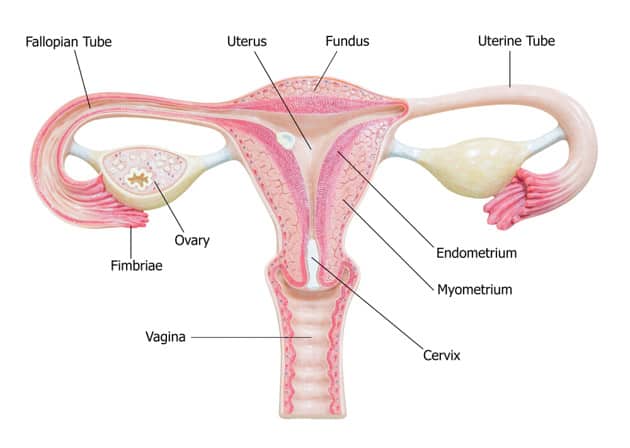
The uterus is comprised of two main parts: the protruding top called the body of the uterus and the narrow lower part called the cervix.
The walls of the uterus contain three layers: the internal coating called the endometrium, the middle muscular layer called the myometrium and the outer layer called the peritoneum.
The uterus is well hidden, so any problems that arise are not easily detectable. That's why we have to be aware of the signs it gives when something is not right. It's vitally important for every woman to visit the gynecologist at least once a year to do preventive exams.
If you feel any type of discomfort, see your doctor. Be aware of your body and any abnormal pain. Check your underwear for strange secretions. These can be signs something is not right.
The main signs of trouble are the following.
1. Pain
Pain that comes from cramps is normal to some extent. These cramps are caused as the uterine contracts to expel the menstrual blood. But if you have pain when you're not on your period or cramps so bad they make you throw up, these are signs you should get some medical attention. This could be endometriosis, which occurs when uterine tissues grow outside of the uterus, or possibly cancer.
Pain or burning during intercourse should also be investigated. You could have genital infections, endometriosis or sexually transmitted diseases.
2. Secretions
It's normal to have vaginal discharge, especially for women in their childbearing years. Menopausal women should have less vaginal secretions. Generally, normal secretions are clear, transparent and colorless. Discharge is only a concern if there is strong odor, change in consistency and color, blood, unusual pain and/or a fever. These signs may indicate there is some type of cervical inflammation.
3. Bleeding
If your period flow dramatically increases or decreases, this is an important warning sign. Similarly, bleeding after intercourse may be cancer. Have a gynecologist check it out.
4. Difficulty conceiving
This is a complex matter with thousands of causes, but infertility can be caused by endometriosis, polycystic ovary syndrome, dysfunction in the thyroid or the adrenals or sexually transmitted diseases. You will need a medical exam for a correct diagnosis.
5. Uterine Hypertrophy
Hypertrophy means the excessive growth or development of an organ. The acceptable size range of a uterus for women is about 2.5 to 9.8 inches. Signs of hypertrophy include the following.
-
Increased volume of menstrual flow
-
The presence of clots
-
Increased urination
-
Bleeding between periods
-
Constipation
-
Feeling of fullness or pressure in the lower abdomen
What causes hypertrophy?
Adenomyosis
This is when endometrial tissue, which is normally lining the uterus, grows within the uterus' muscular wall.
Cysts
These are benign formations that can cause pain and delay of menstruation in some cases.
Myoma
A Myoma is a benign tumor in the wall of the uterus. The majority of women will not produce symptoms and will not need to be treated, but 25 percent will require medical attention. This is more common in women who are black, obese, have diabetes, have a family history of fibroids and/or have never had children. Women who eat a lot of red meat are twice as likely to develop uterine fibroids. Eating vegetables decreases the chances.
The body knows how to express when something is not right. One way or another it sends signals. It is up to us to be attentive. Have preventive examinations regularly, and, if there is pain, discomfort, a bad smell or any other abnormality relating to your uterus, see your gynecologist.
This article was adapted and translated from the original, "5 sinais que o útero dá quando algo não vai bem," which was originally published on Familias.com.br.


